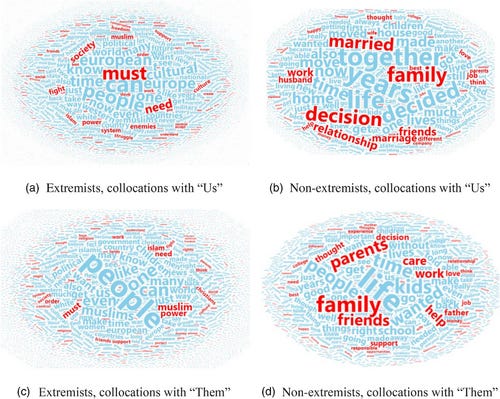'Us' and 'them' in extremist texts
Also: out-group favoritism, Chinese information operations, and Holocaust memory
Motivations for violent extremism: Evidence from lone offenders’ manifestos
This is a great analysis looking at the language used in extremist manifestos by parsing out words associated with “us” and “them.” The in-group (us) was associated with security and in-group values were seen as universal values. Out-groups were discussed mainly in the context of power and dominance. There are a lot of interesting details in here, well-worth your time.
The Politics of Respectability and Black Americans’ Punitive Attitudes
A nagging problem in Social Identity Theory is out-group favoritism, or why people sometimes align themselves with an out-group even when it disadvantages them personally. System Justification Theory (Jost) offers some explanation, by arguing that people may favor the status quo over identity in certain contexts. This very interesting paper takes another approach, looking at the politics of respectability. I’d argue it’s pretty short walk to reconcile respectability with system justification.
Holocaust memory and political legitimacy in contemporary Europe
An examination of how post-Communist European states frame the Holocaust around the suffering of non-Jewish ethnic majorities instead of centering crimes and atrocities against Jewish people. For a related, more narrative take on this subject, check out my friend Judy Rakowsky’s recent book, Jews in the Garden: A Holocaust Survivor, the Fate of His Family, and the Secret History of Poland in World War.
How the People’s Republic of China Seeks to Reshape the Global Information Environment
The State Department offers a look at Chinese information operations, including propaganda, censorship, partnerships and dominance over Chinese-language media. Efforts are multi-platform, with overt and covert components. The report estimates that China’s investment in information operations runs in the billions of dollars.
Engagement, User Satisfaction, and the Amplification of Divisive Content on Social Media
A study looked at algorithmic ranking on Twitter in the early Musk era (February 2023). It found that the algorithm amplified divisive and conflict-oriented content, but importantly found that users didn’t like what they were being served. It also looks at the pros and cons of potential alternative algorithmic approaches.


